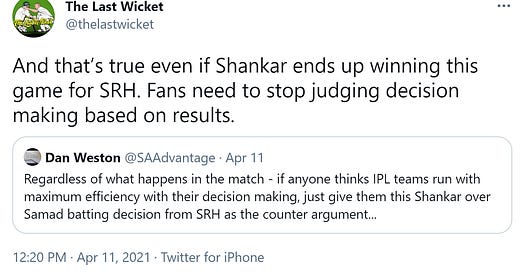What's the right way to judge an on-field decision?
Was Sanju Samson wrong in not taking that single v/s Punjab Kings?
With the IPL fever on, cricket fans around the globe are active and ready to outrage at anything they disagree with. One such occasion was when Rajasthan Royals suffered a 4-run defeat against Punjab Kings.
If case you missed it, allow me to re-create the scenario for you - Chasing a mammoth 222 at the Wankhede, Rajasthan Royals needed 5 runs off 2 balls when Sanju Samson batting past a 100 hit the ball in the long-off region and refused a single to South African allrounder Chris Morris. He ended up getting caught on the boundary off the last ball after trying to hit it for six over cover.
A majority of fans criticized Sanju Samson for “not trusting Chris Morris” or “sending the wrong signal to him as captain”. This was again talked about when Morris got Rajasthan over the line in the next game versus Delhi Capitals. That’s exactly why everyone should have an understanding of poker. The decision-making framework poker experts use to “gamble” is useful in sport and every walk of life. Here are the basics:
Understand that every decision will not go in your favor;
Try to gather the probability/odds of a decision getting the desired result;
And most importantly; bad/good outcome does not equate to bad/good decision
Coming back to Cricket, let’s break that situation down to understand all the parameters in play:
At that point, Sanju Samson was batting 119* off 61 balls. After a relatively slow start, he had scored 66 off the last 28 balls. In fact, the previous ball that over he had crunched over cover for 6.
Chris Morris is a fine striker of the cricket ball. But after 19.4 overs in the game, he had faced just 4 balls scoring 2 runs. It was also the first match in the IPL and hadn’t batted a lot in an actual game in nearly 2 months.
Finally, the way that the 5th ball was placed there was no chance of running 2, apart from an obvious error from the fielder. Taking one would take the scoreline to 4 needed off 1 ball. Some argued this is a better situation than 5 runs in 1 ball since there is a better chance of a tie. This isn’t quite true since the Wankhede is a small ground where running 3 is virtually impossible.
So Morris would have is to go for a boundary himself. And with the 7-2 field set for Arshdeep, bowling wide yorkers from over the wicket (for a left arm), the realistic option was clearing the boundary. Well set Samson definitely had a better probability of doing that than a new batsman.
And that’s why it was the “right” call - what Morris did in the next game is irrelevant. In fact, the result of that very game is irrelevant as well. And Sanju Samson knows that.

Cricket fans I interact with sometimes tell me I am too nice on players and teams, but I am not trying to argue there are no poor decisions. In fact, teams and franchises continue to make poor decisions every now and then. Here’s one example from SRH in their 1st game of 2021:


Poor decisions are just not as common as the average fans think. And evaluating a decision often requires contextual knowledge rather than a glance at the result. No wonder, one of India’s most loved captains, MS Dhoni, often made statements saying his focus was on the process and not the result. His mindset is essentially the same as that of the poker players - focused on understanding all the parameters (in other words, calculating the odds/probability) rather than worrying about results in the short term. And most international players take the same approach, even if they don’t verbalize it in the same manner.
Of course, the one difference between poker and cricket is that the latter requires effort for proper execution. And that adds another layer of complexity to this beautiful game since better players (and hence better teams) generally execute better and win more 50-50 battles than the opposition. It’s why Kohli has a higher win % for India than his predecessors and Rohit Sharma’s Mumbai Indians are the team to beat in T20 cricket.



